Entangling Vines

Wisdom Publications, Inc.
199 Elm Street
Somerville, MA 02144 USA
www.wisdompubs.org
2013 Thomas Yh Kirchner
All rights reserved.
No part of this book may be reproduced in any form or by any means, electronic or mechanical, including photography, recording, or by any information storage and retrieval system or technologies now known or later developed, without permission in writing from the publisher.
Library of Congress Cataloging-in-Publication Data
Shmon kattsh. English.
Entangling vines : Zen koans of the Shmon kattsh / translated and annotated by Thomas Yh Kirchner ; foreword by Nelson Foster ; introduction by Ueda Shizuteru. First Wisdom edition.
pages cm
Previously published: Saga Tenryuji : Tenryu-ji Institute for Philosophy and Religion, 2004.
Includes bibliographical references and index.
ISBN 1-61429-077-6 (cloth : alk. paper)
1. Rinzai (Sect)Quotations, maxims, etc. 2. Koan. I. Kirchner, Thomas Yh, translator, writer of added commentary. II. Title.
BQ9367.S5813 2013
294.3927dc23
2012037699
ISBN 978-1-61429-077-3
eBook ISBN 978-1-61429-096-4
17 16 15 14 13
5 4 3 2 1
Cover art by Phil Pascuzzo. Cover design by Gopa&Ted2. Set in Minion Pro and SimSun fonts 10.5pt/12.6pt. Typesetting for this book was done by Thomas Yh Kirchner.
Wisdom Publications books are printed on acid-free paper and meet the guidelines for permanence and durability of the Production Guidelines for Book Longevity of the Council on Library Resources.
Printed in the United States of America.
 This book was produced with environmental mindfulness. We have elected to print this title on 30% PCW recycled paper. As a result, we have saved the following resources: 12 trees, 6 million BTUs of energy, 1.024 lbs. of greenhouse gases, 5,553 gallons of water, and 327 lbs. of solid waste. For more information, please visit our website, www.wisdompubs.org.
This book was produced with environmental mindfulness. We have elected to print this title on 30% PCW recycled paper. As a result, we have saved the following resources: 12 trees, 6 million BTUs of energy, 1.024 lbs. of greenhouse gases, 5,553 gallons of water, and 327 lbs. of solid waste. For more information, please visit our website, www.wisdompubs.org.
Contents
T HIS BOOK OFFERS ENTANGLING VINES, but who would want them and what for? The phrase suggests tough, jungly vegetation that will trip you up, snag you in its rope-like sinews, and hold you captive. As a title, it seems calculated to put off all but the boldest or most foolhardy readers, signaling that exploration of these pages will be a strugglearduous, exhausting, possibly futile altogether. It invites risk-takers, curiosity seekers, and especially, perhaps, people driven to get to the bottom of lifes biggest questions. Shall we count you in?
As the subtitle makes clear, the vines threatening to tie us up here are koans, the famously enigmatic little stories of Zen tradition. The liveliness and strangeness of koansthe humor and inscrutability of their repartee, their unorthodox treatment of Buddhist doctrine, the indifference they exhibit to logic or social convention, their frequent eruption into hitting and hollering, their broad expressive range, from crudeness to banality to poetry of great subtlety and beautyhave made them intriguing to people of diverse cultures ever since they emerged as a feature of Zens Chinese precursor, Chan, some nine centuries ago.
Understanding has lagged far behind interest, unfortunately. In attempting to characterize koans, popular writers commonly resort to the words puzzles and riddles, which are so inaccurate as to be positively misleading. Academic specialists fare little better with such arid definitions as pedagogical tools for religious training. Zen masters, who seem supremely qualified to explain the nature and working of koans, typically deflect requests for such information, declaring words inadequate to do justice to the phenomenon. Try a koan and see for yourself, they say.
Which brings us back to the entanglement under considerationyours. Entanglement in koans takes two basic forms, one of them praised in Chan and Zen tradition, the other deplored, even ridiculed. The latter is a fascination with koans that remains merely literary or intellectual. The tradition doesnt reject such pursuits wholesale; indeed, it possesses an extraordinarily rich literature, and many of its great figures have demonstrated nimbleness and delight in the life of the mind. Zen has always insisted, however, that other interests be subordinated to practice and awakening, and it deploys a set of vivid metaphors to emphasize the absurdity and fruitlessness of a Zen student entering the thickets of analysis and interpretation before experiencing insight: heading east when you want to go west, scratching your shoe when your foot itches, beating the cart instead of the horse.
The approved form of entanglement with koans involves thorough, sustained absorption in one koan at a time, in the hope that it will eventually resolve in a deeply liberating realization. Before the process runs its course, however, engaging a koan in this fashion often feels tedious or even torturousevery bit as constricting and exasperating as the title metaphor impliesand the bonds grow still tighter if one thrashes around mentally in the effort to get loose. So whoever originally applied the phrase entangling vines to koans undoubtedly deserves a prize for Truth in Advertising (Medieval Chinese Division). It wasnt a private effort, though; institutionally, for centuries Chan and Zen have stressed the hardship of working with koans, promoting images of the process even more painful to contemplate than getting snarled in a web of creepers. The most cringe-inducing of these liken koan study to nightmares at the dining tablegnawing on an iron bun, eating the putrid mash left after the fermentation of alcohol, lapping up the shit and piss of bygone sages, swallowing a red-hot iron ball that cant be disgorged.
Despite such repulsive warnings, generations of Zen practitionersmale and female, lay and monastic, dauntless or terrifiedhave undertaken koan work and survived to verify its joys and lasting benefits as well as its intermittent miseries. Most descriptions of the process attribute the difficulty of koans to their deliberate thwarting of rationality. By this account, koans function as efficient traps for logical thought because the masters of old designed them expressly for that purpose. While its true that logic rarely produces significant insight into a koan, the notion that koans are explicitly intended to impede logic doesnt hold up.
Centuries ago, the annals of Chan tell us, a monk questioned his distinguished master about the sayings of his predecessors, asking, Did the buddhas and ancestral teachers have the intention of tricking people or not? The masters reply holds for Buddhist texts of all kinds but fits koans particularly well:
Tell me, do rivers and lakes have any intention of obstructing people? Although rivers and lakes have no intention of obstructing people, still people cant cross them, so they become barriers from a human standpoint. Although ancestral teachers and buddhas had no intention of tricking people, right now people cant go beyond them, so ancestral teachers and buddhas trick people after all.
Rather than presuming that koans were created to confound us, we would do well to take them at face value, as good-faith attempts to present the Dharma, the wisdom of the Buddha, in a straightforward, perhaps striking, manner. Many events in everyday life surprise and confuse us, after all, though no one intends them to; we simply dont understand them or even know how to understand them. From this perspective, it seems utterly unremarkable that a koana few words cherished for illuminating reality in a profound waywould go over our heads on first encounter (and maybe for quite a while afterward). Koans often perplex the monastics and laypeople who appear in them, and evidence abounds that theyve perplexed innumerable monks, nuns, and laypeople whove pondered them as well. Youre baffled by them? Big deal. Join the crowd.
Next page
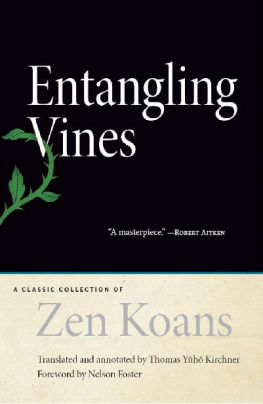
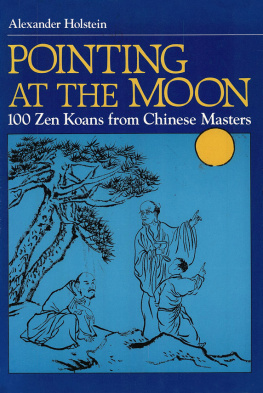
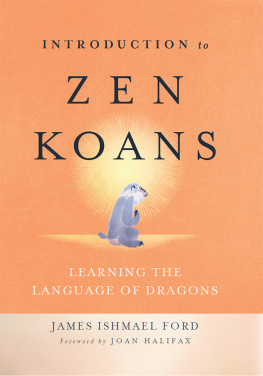
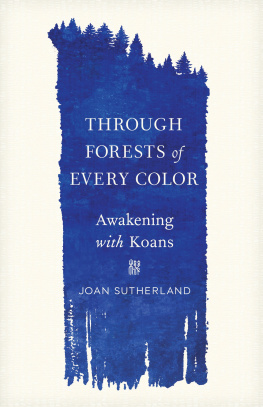


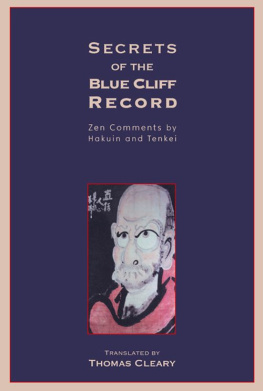
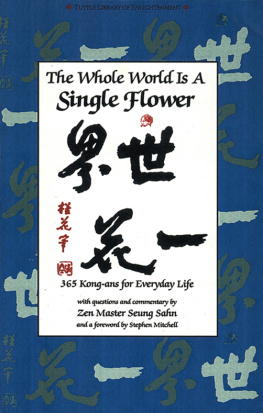
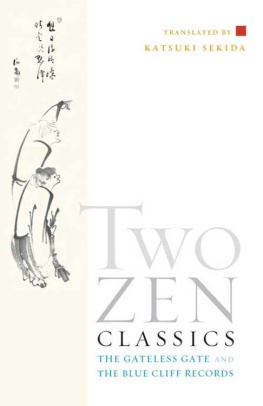
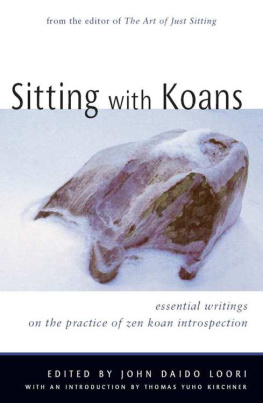
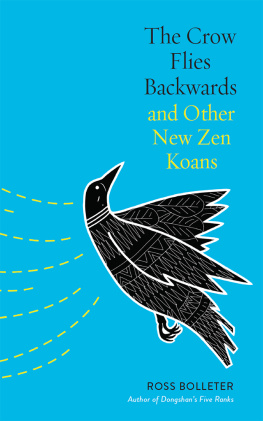
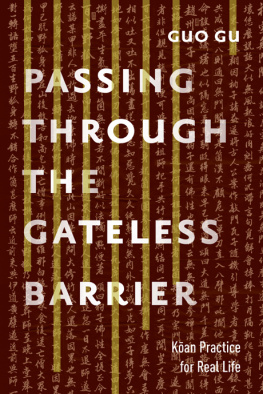

 This book was produced with environmental mindfulness. We have elected to print this title on 30% PCW recycled paper. As a result, we have saved the following resources: 12 trees, 6 million BTUs of energy, 1.024 lbs. of greenhouse gases, 5,553 gallons of water, and 327 lbs. of solid waste. For more information, please visit our website, www.wisdompubs.org.
This book was produced with environmental mindfulness. We have elected to print this title on 30% PCW recycled paper. As a result, we have saved the following resources: 12 trees, 6 million BTUs of energy, 1.024 lbs. of greenhouse gases, 5,553 gallons of water, and 327 lbs. of solid waste. For more information, please visit our website, www.wisdompubs.org.